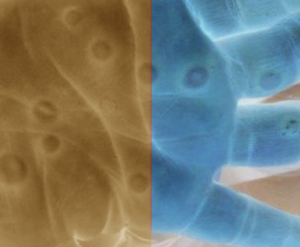Ending the monkeypox outbreak through vaccination, contact tracing and early diagnosis
3 August 2022. Related: mpox, Coinfections and complications.
Kirk Taylor, HIV i-Base
 By 25 July 2022, over 2,000 confirmed cases of monkeypox (MPX) have been identified in the UK. A commentary in the Lancet Infectious Disease discussed ways to reduce transmission and ultimately end the outbreak. [1]
By 25 July 2022, over 2,000 confirmed cases of monkeypox (MPX) have been identified in the UK. A commentary in the Lancet Infectious Disease discussed ways to reduce transmission and ultimately end the outbreak. [1]
The ‘R’ of previous MPX outbreaks in African countries was below 1, as each person passed the virus to fewer than one other contact. Cases tended to be single individuals or small localised groups. Transmissions were mainly within households and outbreaks were self-limiting.
The rise in MPX cases in Nigeria and DRC were predominantly in children and adolescents with transmission from animals and looks directly related to ending the policy of smallpox vaccinations’ These factors lead to experts estimating that R could be as high as 3.
The authors consider steps that to reduce R and end the MPX outbreak. Considering the long incubation period (up to 20 days), contact tracing, and vaccination for those at high risk, it may be possible to achieve an R below 1.
comment
R numbers reported for the current MPX outbreaks are much more likely to be related to social dynamics than properties of the virus. WHO report that R is currently 1.6 in the UK, 1.8 in Spain and 1.4 in Portugal. [2]
The suggestion that contact tracing might contain MPX was based on a poor understanding of these social dynamics, especially with an incubation time that could be several weeks.
Contact tracing might help some individuals but numbers are now too high for this to limit PMX on a population level, especially without funding.
The health response is now rightly catching up with a vaccine programme.
The UKHSA did not originally include information about vaccine efficacy after single and double shots, the time needed for immune responses to develop and the possibility of lower responses to a single shot in people living with HIV. An updated version of patient information now covers some of these points, but not all. [3]
However, the agency has taken care to work with community organisations to minimise the risk of stigma against the networks where MPX was unlucky enough to first be affected.
References
- Schneider KA et al. Does it matter who is spreading monkeypox? Lancet Infectious Diseases. DOI: 10.1016/S1473-3099(22)00431-5. (28 June 2022).
https://www.thelancet.com/journals/laninf/article/PIIS1473-3099(22)00431-5/fulltext - WHO. Second meeting of the International Health Regulations (2005) (IHR) Emergency Committee regarding the multi-country outbreak of monkeypox. (23 July 2022).
https://www.who.int/news/item/23-07-2022-second-meeting-of-the-international-health-regulations-(2005)-(ihr)-emergency-committee-regarding-the-multi-country-outbreak-of-monkeypox - UKHSA. Protecting you from monkeypox: information on the smallpox vaccination. (Updated 1 August 2022, 2nd edition).
https://www.gov.uk/government/publications/monkeypox-vaccination-resources/protecting-you-from-monkeypox-information-on-the-smallpox-vaccination

